Sunday March 15th, 2026
Seoul, Korea
Distance: Marathon · 10K
Offical Race Web Site
The only marathon hosted in the heart of the Korean capital. Seoul marathon is the oldest marathon race hosted in Asia andis one of the fastestmarathon in the world.
First held in 1931, Seoul marathon is the oldest marathon event
continuously held in Asia, and the second oldest in the world following
the Boston Marathon.
It embodies modern history of Korea, also referred to as
“The Miracle On the Han River”, as the race starts from Gwanghwamun (the palace) -the very heart of South Korean Capital, passes through the city hall and “Cheong-Gye-Cheon” - the testament of Korea’s modern history, and ends in the Seoul Olympic Stadium where 1988 Summer Olympics was held.
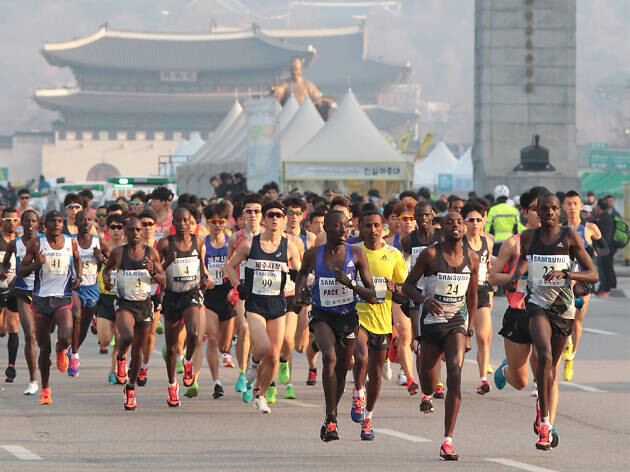
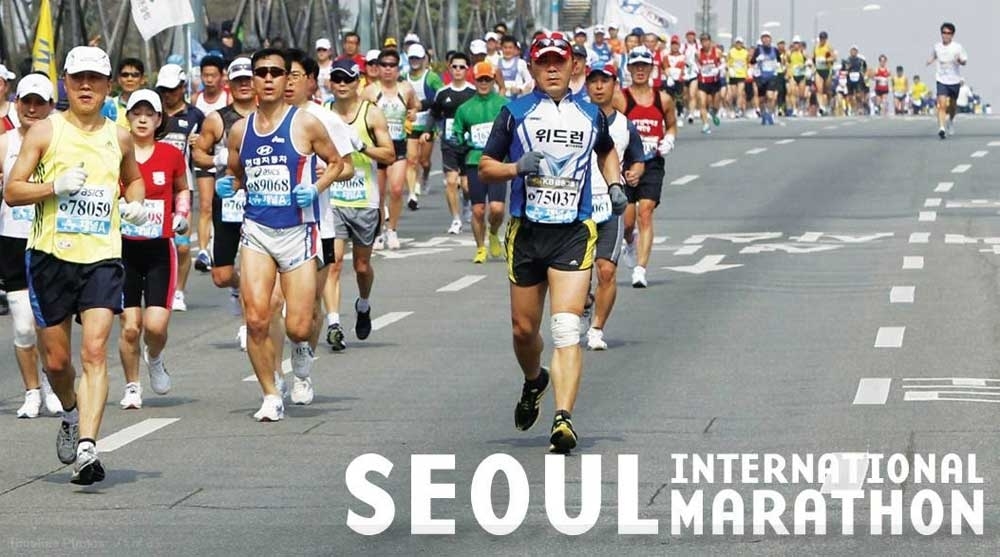
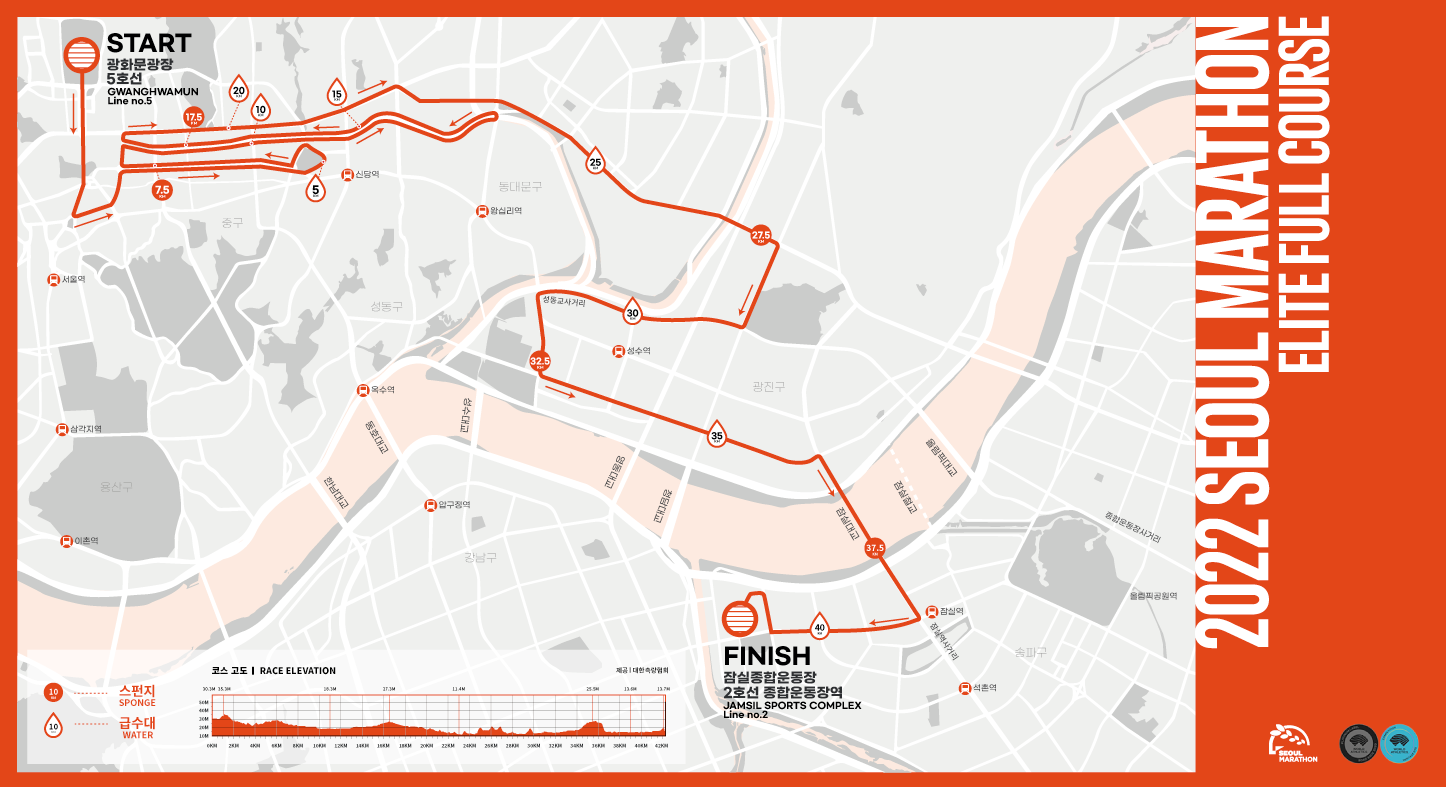
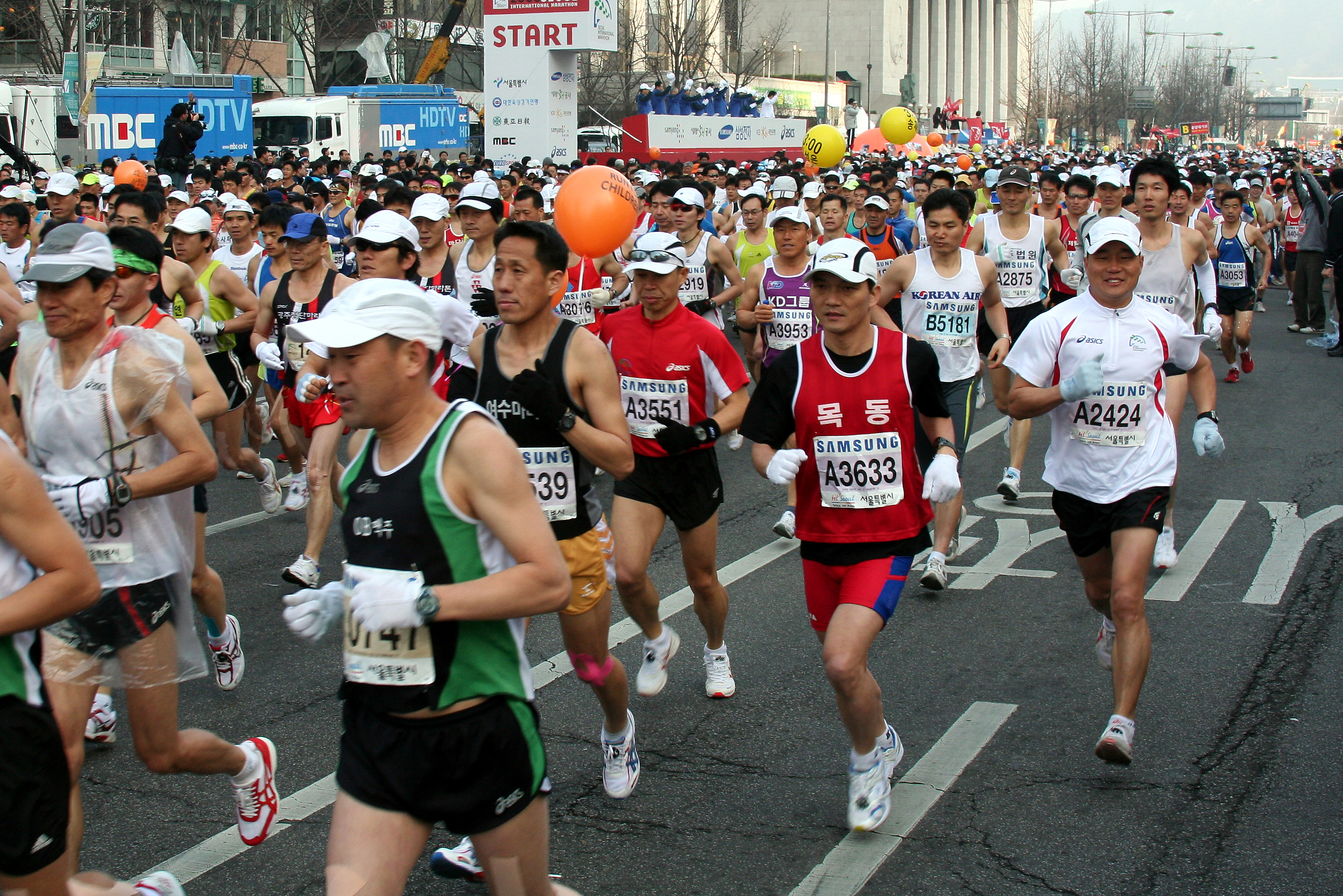

History of Dong Ah Marathon Fame
| 3/21/1931 | The 1st Marathon Gyeongju (sponsored by the Korea Athletics Association, sponsored by the Dong-A Ilbo Chosun Sports Association) held 14 miles (23.2km) course between Seoul and Yeongdeungpo |
| 3/21/1933 | The 3rd Gwanghwamun ~ Cheongryangri ~ Mangwooli Changed to the 15-mile course of Kyungchun Highway Yangjunggobo's Son Gi-jeong won 1 hour 24 minutes 03 seconds |
| 3/19/1939 | The 10th tournament was changed to Gwanghwamun ~ Naju tong ~ Seodaemun intersection ~ Penglae bridge ~ Han river bridge ~ Nam Kyungseong station square |
| 1941 ~ 1953 | Stopped for 14 years due to repression of Japanese press and war |
| April 18, 1954 | In 1977, the 50th anniversary of the marathon of the Boston Games . |
| Aug. 5, 1955 | Delayed by the Liberal Party |
| April 29, 1964 | Performed in full course (42.195km) and renovated by Dong-A Marathon |
| 1965 | Lee Myung-jung (KEPCO) 2 hours 21 minutes 21 seconds |
| 3/13/1966 | Kim Bok-rae (Coal Corporation) 2 hours 19 minutes 07 seconds Breaking the 20-meter barrier |
| 1970 | For the first time, it invited foreign players such as Canada and Japan to develop into international convention Seoul Playground - changed to flat course of round trip to Uijeongbu Kim Chihwan (KEPCO) 2 hours 17 minutes 34 seconds |
| 1973 | Kim Chihwan (KEPCO) 2 hours 17 minutes 01 seconds |
| 1974 | Moon Hong-joo (Konkuk University) 2 hours 16 minutes 15 seconds |
| 1977 | Japan's Masuda is the first foreign winner |
| 1978 | Han-Do Drug ~ Transition to round-trip course |
| 1979 | Girls 'and boys' high school 10km was established. |
| 1980 | Korea's first female 30km division won the Eun-joo (Minting & Construction) with 2 hours 02:08 |
| March 28, 1982 | Hosted by Seoul International Marathon hosted by KBS 7,466 participants including domestic masters |
| 1983 | Changed course to Jamsil Stadium ~ Gyeonggi-do Seongnam City Mental Cultural Institute |
| 1984 | Lee Hong-ryeol (Kyunghee University) Breaking down the 15 minute wall of the village and winning 2 hours 14 minutes 59 seconds |
| 1986 | Yoo Jae-sung (Korea National University of Fine Arts) 2 hours 14 minutes 06 seconds |
| 1987 | Lee Jong-hee (Cheil Jedang) 2 hours 12 minutes 21 seconds |
| 1988 | Held at the Olympic course |
| 1990 | Kim Wan-ki (Kolon) 2 hours 11 minutes 34 seconds |
| 1991 | Hwang Young-joo, 3rd place in full course first challenge |
| 1992 | Held at Chuncheon-am Amphitheater |
| 1993 | Kim Wan-ki (Kolon) held the best record in the domestic tournament with 2 hours 09:25 |
| 1994 | Changed name to Dong-A International Marathon and 65th Dong-A Marathon Kim Wan-ki (Kolon) 2 hours 08 minutes 34 seconds |
| 1995 | Lee (Cologne) 2 hours 10 minutes 58 seconds to win the Masters 162 people attend a full course Division |
| 1996 | Martin Pizz (Spain) 2 hr 08 min 25 sec. |
| 1997 | Masters Full Course, Half Course, 10km, 5km |
| March 29, 1998 | 6,931 Masters attended the opening ceremony of Mass Marathon |
| March 21, 1999 | Masters 11,303 players participated in the Korean sports history single event for the first time 10,000 participants |
| March 19, 2000 | Changed the course to Seoul in commemoration of the 80th anniversary of the establishment of Dong-A Ilbo Revived international convention in three years |
| March 18, 2001 | The women's division was also promoted to the international convention and won with Yunsun Sook 2 hour 32 minutes 09 seconds |
| Apr. 21, 2002 | 1st National Marathon Competition and Masters Competition held in Anmyeondo High school team 13 men, 9 women and 5,690 masters participated |
| March 17, 2002 | Won theWorld Cup successWonrepresentative countries of 32 countries participating marathonersDong-A Seoul International Marathon for the first time in the history of Korean marathon Asahi Japan, foreign broadcasting companies such as China CCTV broadcast |
| March 16, 2003 | 3 consecutive broadcasting stations for 2 consecutive years (Korea KBS, China CCTV, Japan TV Tokyo) |
| September 28, 2003 | The marathon race across the country and held at the Baekje Big Gil Masters Competition Princess |
| March 26, 2004 | The 3rd National Marathon |
| October 10, 2004 | 2004 Holding the Marathon in Baekje Village |
| March 12, 2006 | Over 20,000 Masters participants in Korea |
| Oct. 21, 2007 | Revived Gyeongju International Marathon |
| March 21, 2010 | Seoul International Marathon held as the only gold label competition in Korea |
| Oct 8, 2011 | Name changed from Baekje Marathon to the Princess Marathon |
| March 18, 2012 | The highest number of domestic marathon tournaments Wilson Roya na Eeroupe (2:05:37) |
| Oct 7, 2012 | Princess marathon 5km (princess course) was newly established. |
| 2013.3.15 | Established Seoul Challenge 10K division |
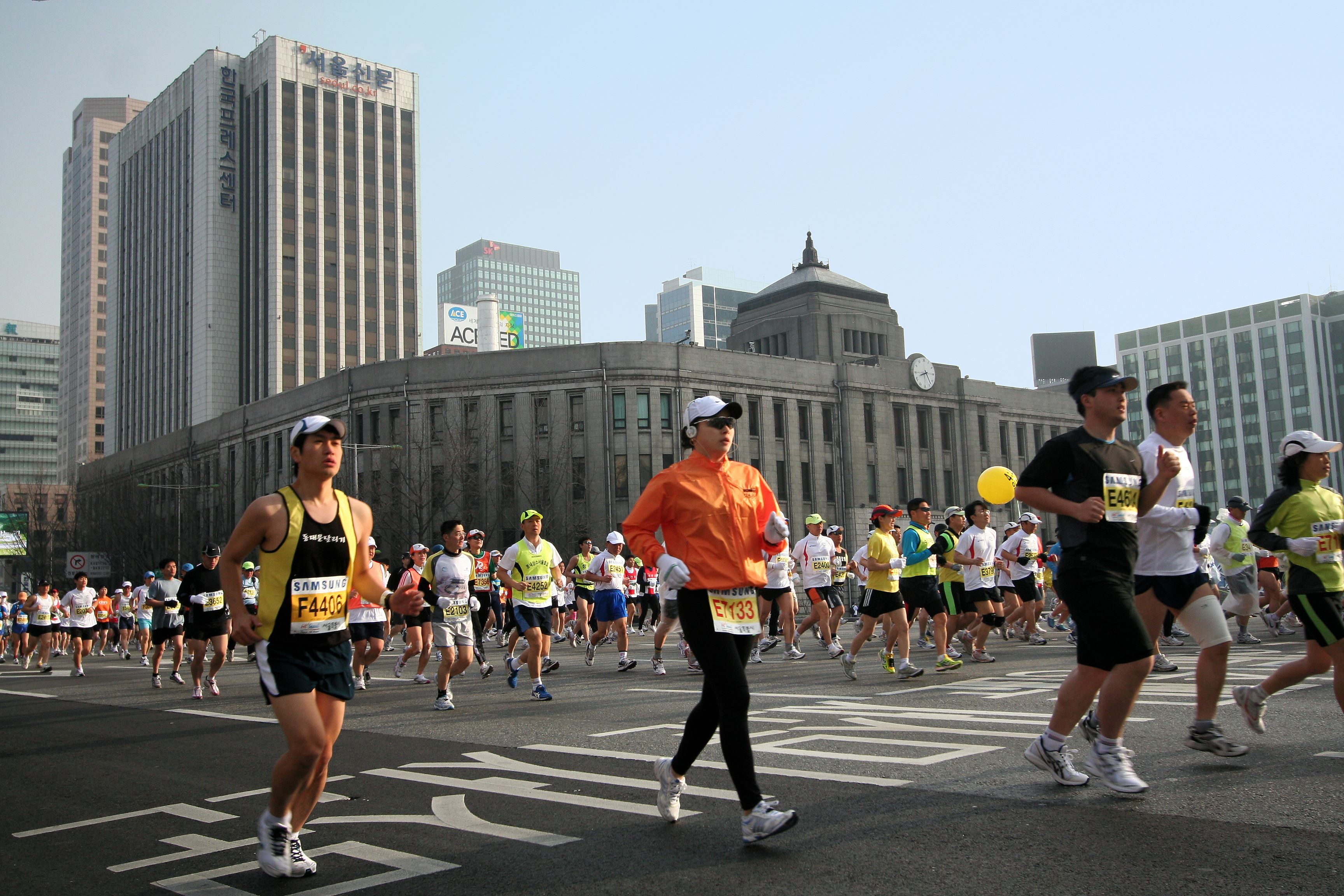
- Start : Seoul Gwanghwamun Square
- Finish : Jamsil Sports Complex, Olympic Park







